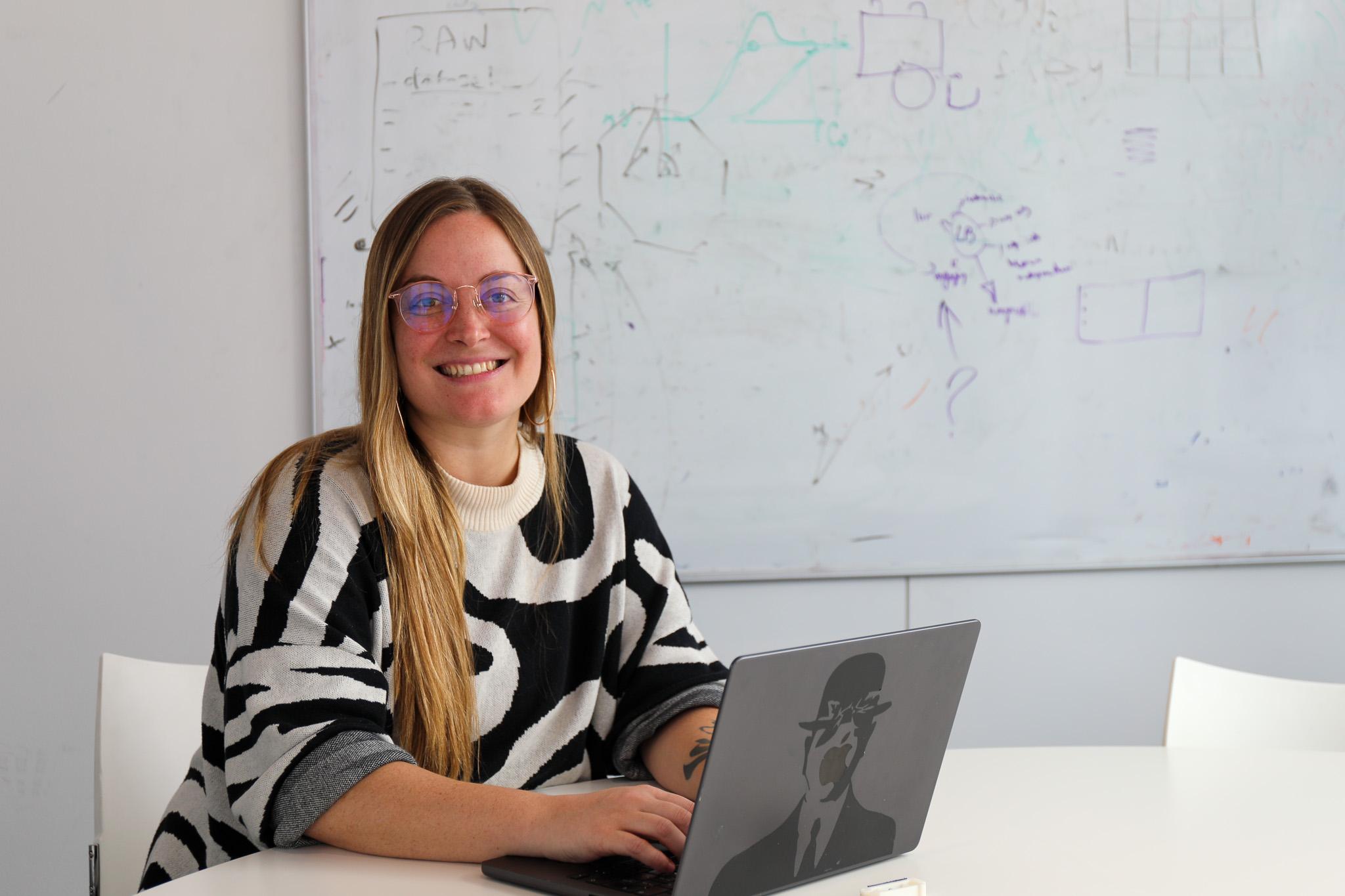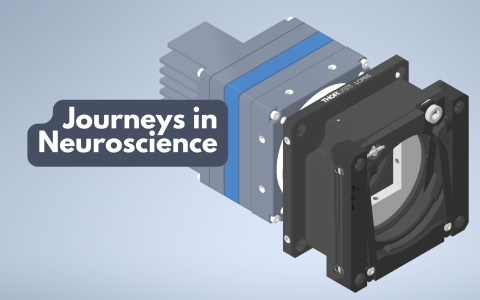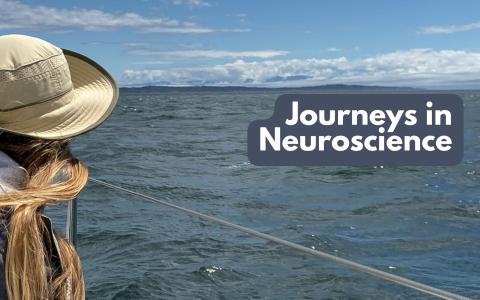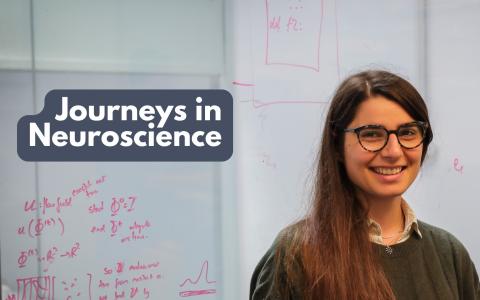
Sleep, science and society
An interview with Dr Rachel Swanson, conducted by Alison Cranage.
Curiosity, creativity and a drive to understand how the brain learns have shaped Rachel Swanson’s path through art, biology and neuroscience. Now working at the Sainsbury Wellcome Centre as a Senior Research Fellow, she combines experimental and computational approaches to explore how we learn and how sleep reshapes knowledge.
In this article, Rachel reflects on the challenges and rewards of life in science.
Why did you become a scientist?
Actually, I think all kids are natural-born scientists, so this question is perhaps better asked: what encouraged and developed this instinct?
Fortunately, both of my parents are teachers, so I grew up in a house where curiosity-driven interrogation of the world was the norm. This helped me learn to approach uncertainty with less fear, which I think is essential when navigating unknown spaces professionally. From there, I guess I just never left school.
Tell me about your career – what led you to neuroscience?
In University, I knew that I wanted to do some sort of science. I think my main motivation at the time was in finding a way to systematise my understanding of the world. I began with Biophysics, but the scope of the material felt increasingly too narrow – the Krebs’ cycle can only inspire so much ardour.
At that time, systems and computational neuroscience were just starting to emerge (or at least my awareness of them). I think I was drawn to systems neuroscience because concepts that we can empathise with are its purview, like what is thought, what are memories, how do we work. And then with computational neuroscience, we can math them.
I thus switched over to evolutionary neuroscience for my master's at Cornell, and then for my PhD, I studied sleep and theories of learning.
What are the main questions that you're addressing now with your research?
I am one of many people who are interested in a core question in our field - how does an animal continually learn – or how does it build its understanding of the world and update that understanding over time?
This is a hard problem, for which there are many sub-problems. The little slice that I'm focusing on right now is how sleep is useful for this. When you are asleep, the brain doesn't just turn off. Rather, a bunch of active things are happening that we collectively call ‘spontaneous activity’. Something about this spontaneous activity reshapes our knowledge in a way that can’t be done while animals are awake, and is essential for future adaptive behaviour. We call this ‘offline learning’. Within this, I’m focusing for now on systems consolidation, or the transfer of memories from short to long term.

Dr Rachel Swanson
How do you approach those questions?
In my PhD and now in postdoc, I'm trying to use both experimental and computational methods. In terms of experimental methods, we plan on recording from the brains of sleeping mice who are learning to generalise a navigational rule across days. We have only recently had technology that allows us to record across brain regions from many, many neurons at the same time. So we are only just starting to get data sets that allow us to meaningfully answer multi-regional questions about generalisation and continual learning.
The experimental branch of the work is essential, but we need to know what to look for in these huge data sets. My primary focus in the lab right now is to build models of systems consolidation at two complementary levels of abstraction: one algorithmic, this abstracts over cells, and the other mechanistic, this includes modelling what individual neurons might be doing.
How do you marry up experiment and theory?
My postdoc is an exercise in exploring and connecting gaps between the two within our topic of interest. This reflects a larger trend in neuroscience, where individual labs and, more broadly, whole institutes are working to ‘close the loop’ between theory and experiment. One of the reasons that SWC is cool is because the Gatsby Computational Neuroscience Unit is situated within the same building as the experimental labs, so the stated goal of my postdoc is mirrored in the literal architecture of the space.
What would you say is the biggest challenge of being a researcher?
I think that some of the biggest challenges in science, though I would even generalise this to any creative career, are problem selection, the emotional complexity that accompanies the arc of any project you’re the arbiter of, time management, and the uncertainty of career outcome.
What's the best thing about your job?
If you’re lucky and have a set of circumstances that allow for this, you get to spend your days thinking about things you’re really interested in while hanging out with cool people interested in the same. And that is really fun.
What do you like to do outside of work?
Art is a huge part of my life and always has been, in fact - I have always switched between prioritising science and art as a career. For example, I started university as a painting major, and I almost quit my neuroscience master's to join Cornell’s architecture school. Ultimately, both science and art, particularly the building and design of spaces, are equally core to my life. Science disciplines imagination toward testable explanations, adjudicated by reproducible evidence and communal critique; art disciplines imagination toward the building of meaningful experience, adjudicated by accuracy of self-expression and aesthetic coherence. Both feel essential.
What's the most exciting thing in neuroscience at the moment?
For me, one of the most exciting things right now is the dialectic that's happening between neuroscience and machine learning. It’s so cool! I'm super interested in this.
Neuroscience studies biological systems that evolved to learn; ML builds artificial learning systems in silico. The shared interest in understanding learning makes the exchange between neuro and ML unusually productive: brains suggest mechanisms (plasticity rules, circuit motifs, states like sleep); ML turns them into formal algorithms. ML failures suggest missing principles; neuroscience can help locate them. For example, inductive biases that make brains efficient (recurrence, sparsity, normalisation, neuromodulation, sleep states) translate into architectures and training schemes that push ML towards improved continual learning abilities, generalisation, and data-efficiency. It’s hard to understate how exciting it is to be in a postdoc while a genuine hybrid field - often called NeuroAI - is emerging. That said, this momentum carries with it the risk of distorting neuroscience toward ML only (and its accompanying short-term commercial incentives). Keeping neuroscience healthy requires a diversity of approaches and, within neuroAI, serious attention to ethics like dual-use risks, environmental costs, and the broader societal impacts of deploying learning systems at scale.
How do you see science’s place in society more broadly?
I’m an American scientist, and I’ve come to see how fragile the institutions that make research possible really are - universities, funding agencies, and public education. We sometimes pretend science floats in a rationalist vacuum, serenely uncovering truth. It doesn’t. Science depends critically on a healthy society: trust, education, and stable civic infrastructure. That creates a civic duty for scientists - not to become partisans of everything, but to help strengthen the conditions that let science thrive. I’m still working out my role, but I believe contributing to institutional health, scientific literacy, and equitable access is part of the job. The activist-scientist hyphenate isn’t common, but that’s changing, and I think it’s important to help drive this change.
It was recently Ada Lovelace Day – do you have any advice for women who might be thinking about working in science?
Unfortunately, in every field of science, women and other marginalised groups face structural disadvantages rooted in our social and institutional histories. The best advice I can give is to come to understand this, build a network of people with whom you can reality-test as a form of mutual support, and know that you can make real change happen. Having these discussions is part of that, as is noting that these problems are hardly unique to academia. In fact, on a positive note, I think our distinctive strength as scientists is that academic culture has built-in mechanisms for critique and revision, and we can (and should) apply that strength to improve our own institutions.
And finally, if you could time-travel, where would you go?
I would go back to 2015 and invest in Bitcoin.
Nice.
Find out more
Rachel is a Senior Research Fellow in the Saxe Lab at the Sainsbury Wellcome Centre, where she uses both experimental and theoretical tools to further our understanding of learning in biological and artificial systems, with an emphasis on porting insights from sleep function into artificial neural networks.
Rachel earned her Ph.D. from NYU in 2023 in the labs of Gyorgy Buzsaki and Jayeeta Basu, with support from the NSF GRFP, and her Masters degree at Cornell University in the lab of David Smith.


